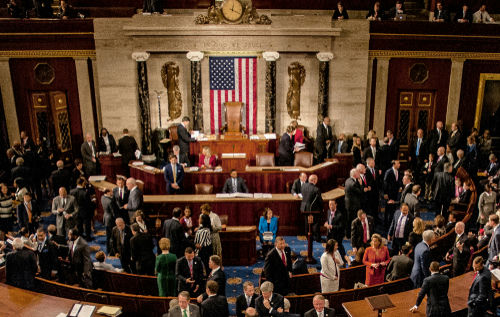As the dust settles on the shuttering of USAID, revelations have emerged that the agency quietly shipped thousands of potentially dangerous viral samples to a Chinese military-linked lab in Wuhan—without even the basic paperwork or oversight one would expect when mailing a package, let alone handling biohazardous material that could threaten global security.
USAID’s Viral Sample Giveaway: No Oversight, No Safeguards, All Risk
The U.S. Agency for International Development, in what can only be described as a bureaucratic masterstroke of naivety and recklessness, funded a program called PREDICT meant to identify pandemic threats by hunting viruses in far-flung corners of the world. Instead of securing these samples in American labs, the agency and its university contractor, UC Davis, saw fit to ship nearly 11,000 viral specimens—including close relatives of the infamous SARS-CoV-2—to the Wuhan Institute of Virology. That’s the same Wuhan lab now infamous for its shoddy safety record, repeated security breaches, and ties to the Chinese People’s Liberation Army. And in a move that would make any compliance officer faint, USAID and its partners did all this without a formal agreement, without a chain-of-custody, and with zero assurance that these pathogens wouldn’t end up misused or weaponized. Internal emails and documents, pried loose by a watchdog’s FOIA lawsuit, confirm that no one bothered to even draft a basic contract. The samples were simply handed over, and America relinquished any say or access to them ever again.
This is not just a bureaucratic blunder. It’s a case study in how taxpayer-funded programs—supposedly designed to protect us—end up undermining our own interests, and possibly putting all of us at risk. The samples, which included material from bats in Yunnan Province, were transferred across borders and into the hands of a lab that U.S. intelligence and biosafety experts now consider a national security threat. And while the PREDICT program staggered to a close in 2019 due to funding cuts and institutional disinterest, the legacy left behind is a Pandora’s box of pathogens now sitting in a facility that has stonewalled U.S. inquiries, refused to share data, and faces growing suspicion for its role in the COVID-19 pandemic.
Expert Outrage and Government Accountability Meltdown
Experts who reviewed the internal documents were left shaking their heads, if not their fists. Richard Ebright, a molecular biologist at Rutgers, minced no words: “The USAID $210 million contract for PREDICT should have included contractual terms that required all samples, or at least copies of all samples, be transferred to and stored by a U.S. government facility. The PREDICT grift did none of this.” Reuben Guttman, a legal expert in whistleblower law, was equally incredulous, stating, “It’s not rocket science to require a contract and supporting paperwork which establishes a relationship, testing protocol, and chain of custody when one is sending out lab samples.”
Please don’t repost this as it might upset @derrickvanorden.
No, please. Really. Don’t. 😝
@rconniff
further busts Van Orden’s lies in the WI Examiner.U.S. Rep. Van Orden blusters, boasts and misleads after gutting health care for WI https://t.co/9n9X284O8j
— Mark Pocan (@MarkPocan) July 10, 2025
The government’s response has been a masterclass in finger-pointing and hand-washing. The State Department insists that no further funding for such programs will be approved under the Trump administration and has pledged a full investigation. Secretary of State Marco Rubio, never one to sugarcoat failure, blasted USAID for “creating a globe-spanning NGO-industrial complex at taxpayer expense” and having “little to show since the end of the Cold War.” The whole affair, Rubio charged, has only worsened instability and anti-American sentiment, with little to no real return for U.S. taxpayers or security.
What This Means for America’s Security, Science, and Sanity
The blowback from this fiasco is just beginning to make waves. In the short term, America has lost access to critical viral samples—some perhaps crucial to tracing the origins of COVID-19. In the longer term, the episode has thrown a wrench into international scientific collaboration, with U.S.-China research now viewed with deep suspicion on both sides. For the global scientific community, it’s a loss of trust and opportunity. For American taxpayers, it’s yet another reminder that government largesse and “global cooperation” often mean writing blank checks with no receipts and no results.
.@derrickvanorden tweeted at 4:30 A.M. Wonder how many he’ll get up to today instead of being focused on his constituents hurt by the “Big, Ugly Bill.”https://t.co/ynPsd9GCQx
— Shawn in WI (@ShawnFetta) July 10, 2025
What’s especially galling is that this sort of blunder isn’t new. Federal agencies have a long, inglorious history of outsourcing critical research to foreign entities with little oversight—remember EcoHealth Alliance?—and then acting surprised when things go off the rails. The closure of USAID and the exposure of these practices have ignited fierce debate over the wisdom, safety, and legacy of U.S.-funded global health initiatives. Calls for tighter biosafety standards and actual contractual safeguards are now ringing louder than ever. Maybe next time, the geniuses in charge will remember that protecting the American people means more than just spending their money and hoping for the best.

